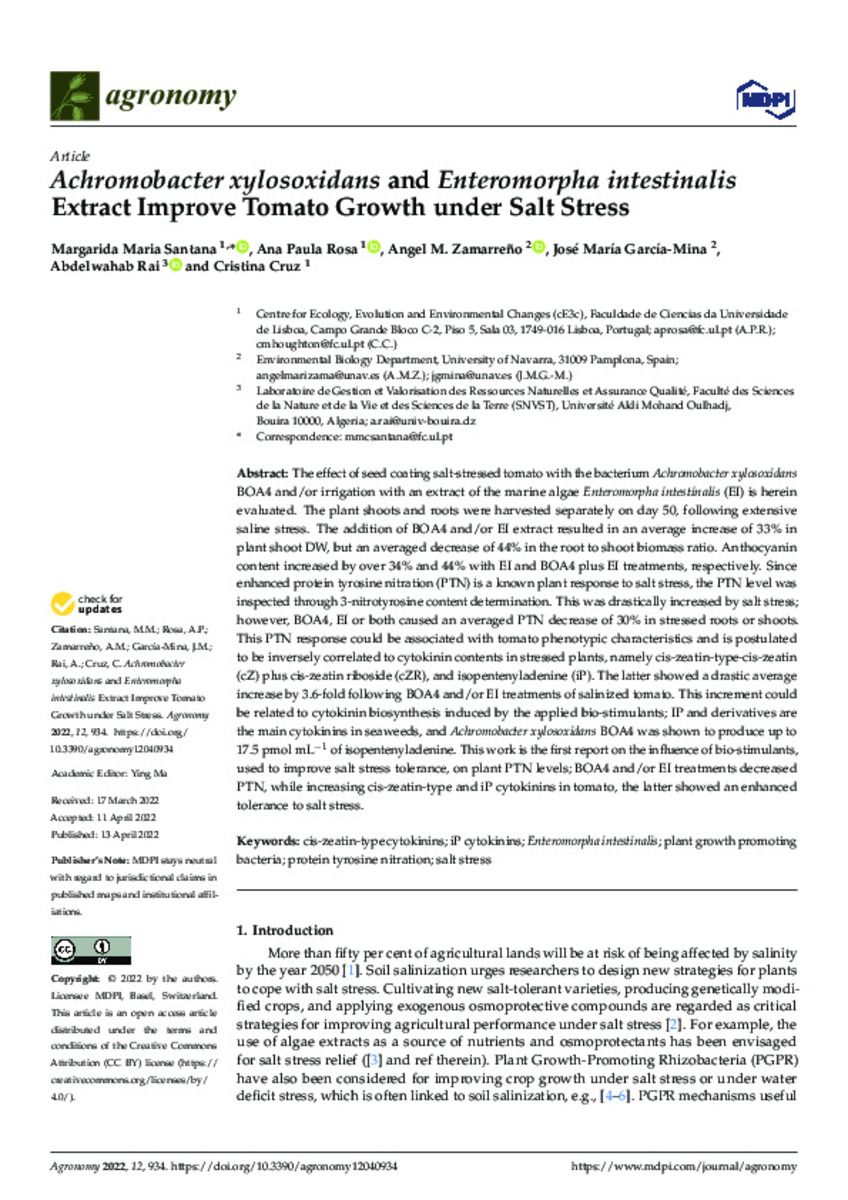Full metadata record
| DC Field | Value | Language |
|---|---|---|
| dc.creator | Santana, M.M. (Margarida Maria) | - |
| dc.creator | Rosa, A.P. (Ana Paula) | - |
| dc.creator | Zamarreño, A.M. (Angel Maria) | - |
| dc.creator | García-Mina, J.M. (José María) | - |
| dc.creator | Rai, A. (Abdelwahab) | - |
| dc.creator | Cruz, C. (Cristina) | - |
| dc.date.accessioned | 2022-08-02T12:13:44Z | - |
| dc.date.available | 2022-08-02T12:13:44Z | - |
| dc.date.issued | 2022 | - |
| dc.identifier.citation | Santana, M. M.; Rosa, A. P.; Zamarreño-Arregui, Á. (Ángel); et al. "Achromobacter xylosoxidans and Enteromorpha intestinalis extract improve tomato growth under salt stress". Agronomy. 12 (4), 2022, 934 | es |
| dc.identifier.issn | 2073-4395 | - |
| dc.identifier.uri | https://hdl.handle.net/10171/63856 | - |
| dc.description.abstract | The effect of seed coating salt-stressed tomato with the bacterium Achromobacter xylosoxidans BOA4 and/or irrigation with an extract of the marine algae Enteromorpha intestinalis (EI) is herein evaluated. The plant shoots and roots were harvested separately on day 50, following extensive saline stress. The addition of BOA4 and/or EI extract resulted in an average increase of 33% in plant shoot DW, but an averaged decrease of 44% in the root to shoot biomass ratio. Anthocyanin content increased by over 34% and 44% with EI and BOA4 plus EI treatments, respectively. Since enhanced protein tyrosine nitration (PTN) is a known plant response to salt stress, the PTN level was inspected through 3-nitrotyrosine content determination. This was drastically increased by salt stress; however, BOA4, EI or both caused an averaged PTN decrease of 30% in stressed roots or shoots. This PTN response could be associated with tomato phenotypic characteristics and is postulated to be inversely correlated to cytokinin contents in stressed plants, namely cis-zeatin-type-cis-zeatin (cZ) plus cis-zeatin riboside (cZR), and isopentenyladenine (iP). The latter showed a drastic average increase by 3.6-fold following BOA4 and/or EI treatments of salinized tomato. This increment could be related to cytokinin biosynthesis induced by the applied bio-stimulants; IP and derivatives are the main cytokinins in seaweeds, and Achromobacter xylosoxidans BOA4 was shown to produce up to 17.5 pmol mL -1 of isopentenyladenine. This work is the first report on the influence of bio-stimulants, used to improve salt stress tolerance, on plant PTN levels; BOA4 and/or EI treatments decreased PTN, while increasing cis-zeatin-type and iP cytokinins in tomato, the latter showed an enhanced tolerance to salt stress. | - |
| dc.description.sponsorship | This work was funded by national funds through FCT—Fundação para a Ciência e a Tecnologia—in the frame of project PTDC/AGR-PRO/1852/2014 and FCT R&D Unit funding UIDB/00329/2020. This work was supported by the Fundação para a Ciência e a Tecnologia (FCT) under Grant SFRH/BPD/109079/2015, attributed to M.M.S, and Grant SFRH/BD/136188/2018, assigned to A.P.R. | - |
| dc.language.iso | en | - |
| dc.rights | info:eu-repo/semantics/openAccess | - |
| dc.subject | Cis-zeatin-type cytokinins | - |
| dc.subject | IP cytokinins | - |
| dc.subject | Enteromorpha intestinalis | - |
| dc.subject | Plant growth promoting bacteria | - |
| dc.subject | Protein tyrosine nitration | - |
| dc.subject | Salt stress | - |
| dc.title | Achromobacter xylosoxidans and Enteromorpha intestinalis extract improve tomato growth under salt stress | - |
| dc.type | info:eu-repo/semantics/article | - |
| dc.description.note | This article is an open access article distributed under the terms and conditions of the Creative Commons Attribution (CC BY) license (https:// creativecommons.org/licenses/by/ 4.0/). | - |
| dc.identifier.doi | 10.3390/agronomy12040934 | - |
| dadun.citation.number | 4 | - |
| dadun.citation.publicationName | Agronomy | - |
| dadun.citation.startingPage | 934 | - |
| dadun.citation.volume | 12 | - |
Files in This Item:
Statistics and impact
Items in Dadun are protected by copyright, with all rights reserved, unless otherwise indicated.






